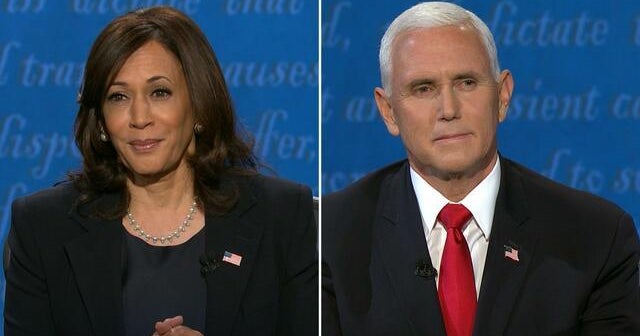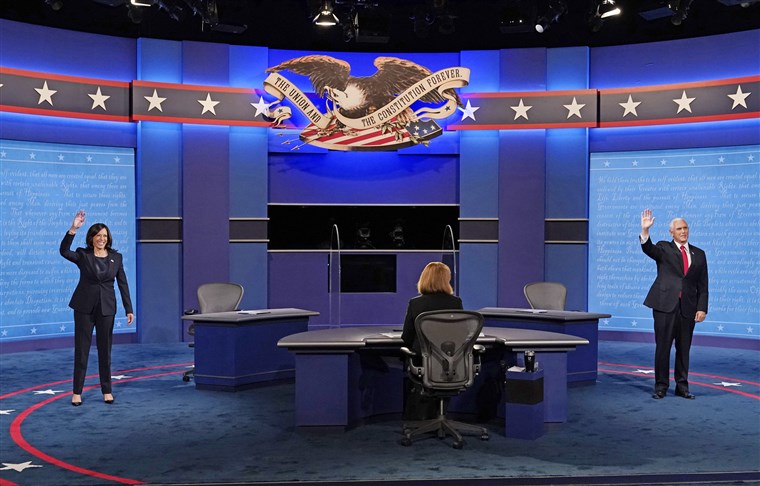Key Issues and Debates: Cbs Vice Presidential Debate

The vice presidential debate provided a platform for the candidates to articulate their visions for the country and address critical issues facing the nation. The candidates, representing their respective parties, presented contrasting perspectives on a range of policy areas, offering insights into their approaches to governing.
Economic Recovery and Job Creation, Cbs vice presidential debate
The debate focused significantly on the state of the economy, particularly the ongoing economic recovery and job creation. The candidates discussed their strategies for addressing unemployment, stimulating economic growth, and ensuring a sustainable economic future.
“Our plan focuses on investing in infrastructure, supporting small businesses, and creating good-paying jobs in the clean energy sector.”
“We believe in a balanced approach that includes tax cuts for businesses and individuals, deregulation, and free trade agreements.”
The candidates highlighted their respective priorities and approaches to economic policy. While both candidates emphasized the importance of job creation, their proposed solutions differed significantly. The first candidate advocated for government intervention and investment in specific sectors, while the second candidate championed a more market-oriented approach with tax cuts and deregulation.
Healthcare Reform
The debate also addressed the complex issue of healthcare reform, a topic that has been at the forefront of American politics for decades. The candidates Artikeld their visions for improving access to affordable healthcare, addressing rising costs, and ensuring quality care.
“We believe in expanding access to affordable healthcare through a public option and strengthening the Affordable Care Act.”
“We support market-based solutions, including health savings accounts and increased competition among insurers.”
The candidates presented contrasting views on the role of government in healthcare. The first candidate advocated for a more expansive role for government, proposing a public option and strengthening existing programs. The second candidate favored a more limited role for government, emphasizing market-based solutions and deregulation.
Climate Change and Environmental Policy
The debate touched upon the critical issue of climate change and environmental policy. The candidates discussed their approaches to mitigating climate change, promoting clean energy, and protecting the environment.
“We believe in taking bold action to address climate change, including investing in renewable energy, reducing carbon emissions, and protecting our natural resources.”
“We support a balanced approach that considers both economic growth and environmental protection.”
The candidates presented distinct positions on climate change. The first candidate emphasized the urgency of addressing climate change, advocating for significant investments in renewable energy and stricter environmental regulations. The second candidate acknowledged the importance of environmental protection but also stressed the need for a balanced approach that considers economic factors.
Media Coverage and Public Reaction

The Vice Presidential debate, a crucial event in the electoral cycle, drew significant media attention and sparked widespread public discussion. The media coverage focused on various themes, while the public reacted with diverse opinions and sentiments, shaping the political landscape and influencing voter perceptions.
Major Themes in Media Coverage
The media coverage of the debate predominantly centered around specific themes, offering various perspectives and analyses.
- Performance Evaluation: The media extensively evaluated the candidates’ performances, analyzing their verbal and non-verbal communication, policy positions, and overall effectiveness in conveying their message. This included assessments of their composure, ability to respond to questions, and overall persuasiveness.
- Policy Differences: The media highlighted the contrasting policy stances of the candidates, focusing on key issues like healthcare, the economy, and foreign policy. The debate provided a platform for the candidates to articulate their views and showcase their policy expertise, allowing the media to delve into the differences and potential implications for the nation.
- Political Strategy: Media outlets dissected the candidates’ strategic choices, analyzing their approaches to specific questions, their attempts to appeal to specific voter demographics, and their overall messaging strategy. This included examining the effectiveness of their attack strategies, their attempts to connect with voters on a personal level, and their efforts to counter the opposition’s arguments.
Public Reaction to the Debate
The public reaction to the debate was diverse, with opinions ranging from strong support to fervent criticism. Social media platforms became a focal point for public discourse, showcasing a wide spectrum of views and reactions.
- Social Media Trends: Social media platforms witnessed a surge in activity following the debate, with users expressing their opinions and engaging in discussions. Trending topics included specific debate moments, candidate performances, and policy positions. The social media landscape provided a real-time reflection of public sentiment and allowed for the amplification of specific narratives.
- Opinion Polls: Opinion polls conducted after the debate revealed shifting voter sentiment, with some candidates gaining ground while others faced criticism. These polls offered insights into how the debate impacted voters’ perceptions and potentially influenced their voting decisions. The polls provided a snapshot of the electorate’s response to the debate and its potential impact on the race for the Vice Presidency.
Potential Impact on the Race for the Vice Presidency
The Vice Presidential debate, with its focus on policy and performance, had the potential to influence the race for the Vice Presidency.
- Shifting Voter Sentiment: The debate could have swayed undecided voters, potentially shifting their support towards one candidate or the other. The candidates’ performances, policy positions, and overall messaging could have resonated with specific voter demographics, influencing their voting intentions.
- Momentum for Candidates: A strong performance in the debate could have generated momentum for a candidate, amplifying their message and potentially boosting their campaign. Conversely, a weak performance could have hindered a candidate’s progress, eroding their support and potentially impacting their chances of winning the election.
Shaping Public Perception of the Candidates
The debate played a significant role in shaping the public’s perception of the candidates, potentially influencing how voters view their qualifications, leadership qualities, and suitability for the Vice Presidency.
- Image and Persona: The debate provided an opportunity for the candidates to project a specific image and persona, showcasing their strengths and attempting to address potential weaknesses. Their demeanor, communication style, and responses to questions could have influenced voters’ perceptions of their character, competence, and ability to handle the pressures of the office.
- Policy Expertise and Vision: The debate allowed the candidates to articulate their policy positions, highlighting their expertise on specific issues and presenting their vision for the future. This could have influenced voters’ opinions on the candidates’ ability to address key challenges facing the nation and their suitability for the role of Vice President.
The CBS vice presidential debate was a whirlwind of policy discussions and heated exchanges, leaving viewers both engaged and exhausted. But amidst the political fervor, one thing remained constant: the need for comfort. Perhaps a sohl furniture life concepts bean bag chair would have been a welcome addition to the debate stage, providing a moment of respite for the candidates and viewers alike.
After all, a little comfort can go a long way in navigating the complexities of political discourse.
The CBS Vice Presidential Debate provided a platform for Kamala Harris and Mike Pence to showcase their policy stances, including their differing views on the pandemic. The debate also sparked conversation about the Nassau County ban on masks , which has become a flashpoint in the national debate over public health measures.
The issue of mask mandates, and the broader response to the pandemic, will likely continue to be a central theme in the upcoming presidential election.
